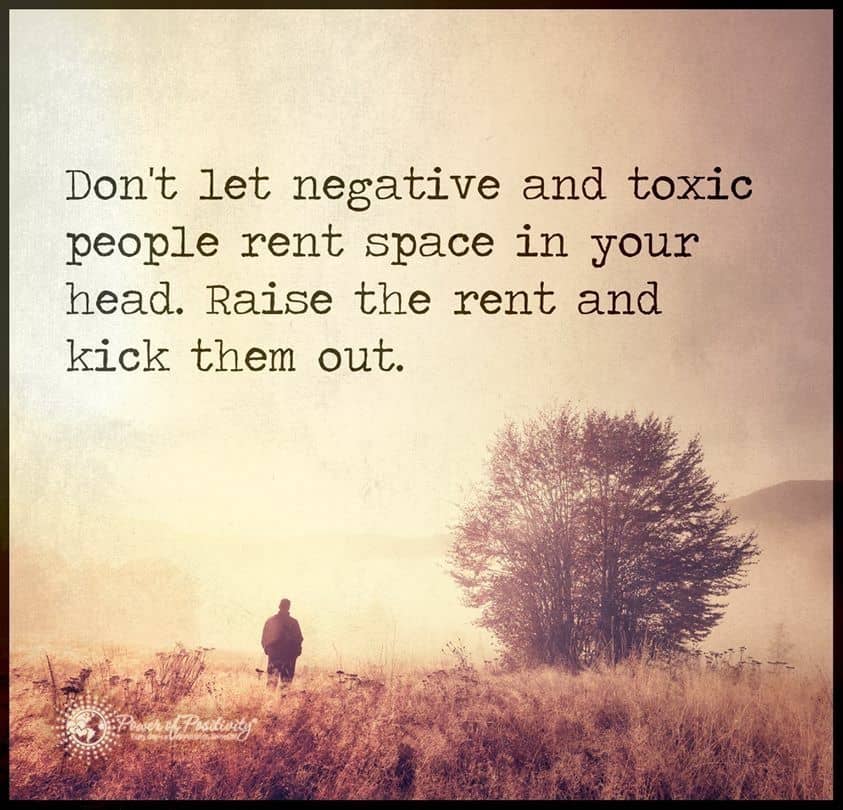It’s nearly impossible to avoid toxic people in daily life. They seem to cause drama wherever they go and have a habit of creating chaos. However, most people don’t realize that those with negative personalities have a lot going on beneath the surface. As they say, hurt people hurt others because they’re simply projecting their pain to anyone who will listen.
Toxic people typically don’t have bad intentions; they may have beautiful hearts but harbor unhealed trauma. When people don’t take time to face their demons, they will inevitably spread their suffering to others. They do this unconsciously, unaware of how their energy impacts people around them.
That doesn’t excuse or justify their behavior, but it does explain why toxic people act the way they do. It’s essential to have compassion for everyone and offer help if you can. However, that doesn’t mean you should walk on eggshells or act like a doormat around people. You can establish healthy boundaries with people while still offering love and compassion.
Below, we’ll go over a few traits of toxic people, along with ways to handle them in daily life.
Seven Characteristics of Toxic People
1. They only consider themselves in relationships.
Toxic people only think about how a relationship will benefit them and never give anything in return. Some call them “energy vampires” because they seem to suck the life force from others who fall into their trap.
Many narcissists automatically feel drawn to empaths and sensitive people because they know they’re easy targets. Manipulative people prey on those with big hearts who genuinely want to help others. Therefore, keeping your guard up is important until you know people better.
Studies show that negative close relationships can cause health problems such as heart disease and poor mental health. Remember to put yourself first, and don’t give others your emotional energy if they can’t respect your boundaries.
2. Toxic people have a victim mentality.
Negative people always seem to blame others for their problems. They can’t take responsibility for anything because they lack self-awareness and discipline. For instance, if they can’t find a job, they might blame employers rather than look at their own shortcomings. That doesn’t mean they shouldn’t get upset when something doesn’t go their way.
However, mature people would turn inward to reflect on how they could improve their chances. They realize that playing the victim card will get them nowhere because blaming others removes the need to take responsibility for their actions. If everyone else causes their suffering, why should they change anything?
So, if you notice someone around you constantly shifts blame to others, they probably have a toxic mindset. In conversations with them, try to change the subject or offer advice when they play the blame game. They might need someone to listen and provide a fresh perspective.
3. They feel jealous of others they perceive as superior.
Toxic people envy others because of their status, career, accomplishments, and possessions. They constantly compare themselves to people to see how they stack up against them. Negative personalities often suffer from an inferiority complex, so they view everyone else as a threat.
If you notice this behavior from people in your circle, try not to take it personally. Anyone who puts you down for your achievements or livelihood secretly wishes they had your life, most of the time.
4. They resort to bullying or other forms of cruelty.
Toxic people often display covert tactics of getting under people’s skin. Their subtle methods of putting people down include name-calling or veiled hostile joking followed by “just kidding.” Narcissists take advantage of any opportunity to put themselves on a pedestal by knocking others down a few notches. They obtain power by boosting people’s self-esteem, only to crush it a few moments later.
Please don’t allow negative comments to change how you see yourself. Nothing can break you if you can operate in the world through the frequency of love.
5. Toxic people often lie through their teeth.
As another form of psychological manipulation, toxic personalities tend to be compulsive liars. To preserve their ego, they must always maintain a particular image to the public. They want others to see them as authority figures and worship the ground they walk on. Toxic people will lie and deflect so that people never see the darker side of their personalities.
If someone tries too hard to be perfect or seems overly concerned with how people see them, they likely have a toxic personality. Offer this person positive energy, but avoid getting caught up in their narcissistic tendencies.
6. They constantly complain.
Negative people never seem to notice anything good happening around them. They only point to the dark clouds without appreciating the rainbow that appears after a downpour. This glass-half-empty approach to life leaves them bitter and resentful and brings everyone around them down. No one likes to hang out with complainers, so keep your distance from such people.
7. They have turbulent relationships.
Toxic people can’t seem to maintain stable relationships because chaos follows them like the plague. They project rather than reflect, and their lack of awareness shows in personal relationships. People close to them may describe them as volatile or unpredictable due to their frequent mood swings.
If you must interact with these personalities often, establish healthy boundaries. For instance, limit your conversations to “safe” topics and walk away when they become confrontational.
Final Thoughts on Traits of Toxic People
Unfortunately, you can’t avoid destructive people in today’s world. In a sense, everyone harbors detrimental tendencies, but not everyone acts on these impulses. Some people have learned to control how they move through the world and react to situations. However, others have a harder time finding their zen and may lash out at people.
Remember to put yourself first when dealing with hostile personalities and avoid drowning in their sorrow. You can still empathize with people without absorbing their energy as your own.



















